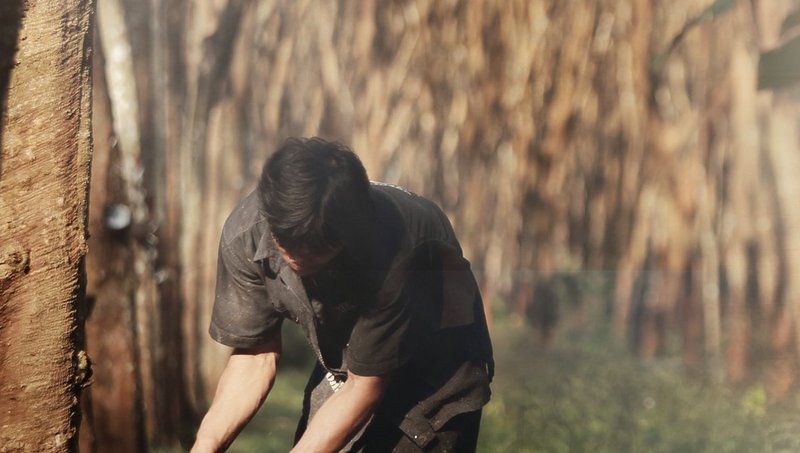Responsible Sourcing of Natural Rubber: Continental Takes on Pioneering Role
- Ambition of Continental Tires: Cover all natural rubber demand exclusively from responsible sourcing from 2030 onwards
- Use of the latest digital technologies to increase supply chain transparency
- Training of smallholders through local development project
Hanover, September 28, 2022. Continental pursues a holistic approach to make the complex and fragmented supply chains for natural rubber more sustainable: The latest digital technologies, local involvement in the cultivation of rubber, and close cooperation with strong partners are aimed at creating more transparency along the entire value chain. “We actively take responsibility in our supply chains. Only when natural rubber is responsibly sourced we consider it a sustainable material,” says Claus Petschick, Head of Sustainability at Continental Tires. As of today, completely seamless traceability of natural rubber is technically impossible due to the high complexity of the supply chain. With its commitment, Continental is working at full speed on a blueprint for the sustainable and responsible structuring of supply chains.
Natural rubber is still essential for ensuring outstanding tire performance. This natural product accounts for between 10 and 40 percent of the entire weight of modern, high-performance tires. The special properties of natural rubber include the high level of strength and durability caused by the strain-induced crystallization of the rubber. Natural rubber is currently obtained almost exclusively from the rubber tree Hevea Brasiliensis. The European Tyre & Rubber Manufacturers Association (ETRMA) estimates that up to six million smallholders worldwide are financially dependent on rubber extraction. In addition, the natural rubber passes through as many as seven different intermediaries and processing companies before it reaches for example Continental’s factory gates.
Ambition: 100 percent responsibly sourced natural rubber from 2030 onwards
Continental's ambition is to source all natural rubber for its tire production from responsible sources from 2030 onwards. In order to achieve this, Continental is particularly pressing ahead with increasing the transparency of supply chains. Innovative technology, digitalization, education projects, and systematic risk mapping are the main tools that Continental uses to make supply chains more sustainable.
In its Sustainable Natural Rubber Sourcing Policy, Continental sets out clear responsibilities and obligations for itself and all suppliers and service providers along the entire value chain for natural rubber. Its sustainable sourcing policy is intended to minimize risks in connection with the environment, human rights, and society.
More transparency in the assessment of sustainability performance
To enable it to assess the sustainability performance of suppliers, Continental has been working with EcoVadis, the world’s leading provider of sustainability ratings for companies and global supply chains, since 2017. Clear responsibilities and obligations for the selection of suppliers help minimize environmental risks and emissions, as well as social and human rights risks.
In cooperation with Michelin and the software developer SMAG, Continental is developing technical solutions for mapping sustainability practices in the natural rubber supply chain. The two tire manufacturers and SMAG have established a joint venture with the name Rubberway that aims to identify potential risks in the supply chain at an early stage. An app gathers and then evaluates data on potential environmental impacts and social and human rights risks. The findings form the basis for minimizing social, human rights, environmental, and economic risks along the supply chain. The joint venture and its concept are in line with the goals of the Global Platform for Sustainable Natural Rubber (GPSNR). As a founding member of the GPSNR, Continental works with other partners to further increase traceability in the value chain for natural rubber. In the GPSNR, NGOs and players that collectively account for more than 50% of global demand for natural rubber and represent all stages of the value chain are working to build a fair and sustainable supply chain.
Digital technology and precise data management create transparency
Using digital technology and comprehensive data management, Continental looks at various points within the natural rubber supply chain in order to increase its transparency. Together with Security Matters (SMX), which specializes in the digitalization of physical objects in the blockchain, Continental has developed a procedure that allows natural rubber to be invisibly labeled with information. The information on the natural rubber can be read using special readers and specially developed software to verify its sustainable origin. In order to procure natural rubber from responsible sources, standardized information on compliance with social and environmental standards and quality criteria can be viewed transparently on the digital trading platform for natural rubber HeveaConnect. The platform also provides the option to incorporate information from the analyses by the joint venture Rubberway. In addition, successful lab tests for marker technology have been completed in another project.
Training smallholders in sustainable rubber cultivation practices
As part of a development partnership with the German development aid agency Deutsche Gesellschaft für Internationale Zusammenarbeit (GIZ), Continental is getting involved right at the start of the supply chain in Indonesia, the world’s second-biggest producer of natural rubber. Production here is mainly carried out by independent smallholders. More than 2.5 million Indonesian farmers cultivate around 85 percent of the country’s growing areas. The farmers mostly live scattered around remote areas, making it difficult to reach them with offers for advice and training. In a joint development partnership, Continental and GIZ are training smallholders locally in sustainable cultivation practices. This helps the farmers to cultivate higher-quality natural rubber, which in turn helps secure the livelihoods of many smallholdings while also preventing deforestation. The number of farmers involved is to be increased from 450 to 4,000 by 2024.
Identifying alternative sources for natural rubber
Natural rubber is a raw material that is used in more than 50,000 products, according to the Fraunhofer Institute. At 73 percent, the tire industry is the biggest consumer of global rubber production. Due to the high global demand for natural rubber, Continental is looking for more ways to extract natural rubber. Together with partners, the tire manufacturer has therefore been researching innovative sustainable materials such as natural rubber from dandelions for years. The central goal of Continental’s Taraxagum project is for natural rubber no longer to be imported exclusively from the tropics in the future and to be produced as close as possible to the tire plants. In this way, further deforestation is to be prevented and CO2 emissions reduced by means of shorter transportation distances.

Henry Schniewind
Head of External Communications
Continental Tires

Laura Averbeck
Manager Communications Sustainability
Continental Tires




